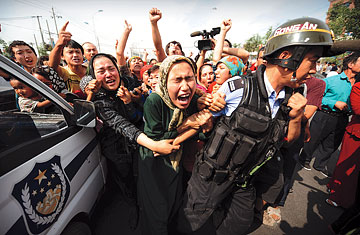
The crying game
Uighur women seeking arrested family members grappled with riot police on July 7
(2 of 2)
Fear and Loathing
Many Uighurs complain that they have become second-class citizens in their own homeland. Government authorities limit the numbers of Muslim Uighurs allowed to go on pilgrimage to Mecca and handpick clerics to deliver politically approved sermons at Friday prayers. Teaching of the Uighur language, which is written in the Arabic script, has been curbed so that Uighurs can more easily assimilate into the wider Chinese society. Yet Uighurs say that they are discriminated against by Chinese companies that operate in Xinjiang. They face restrictions on their travel abroad and even within China itself; repeated stories in the media over the past year, describing attacks and plots by "terrorist" Uighur separatists, have deepened Han Chinese suspicion to the point where many hotels in coastal cities will refuse Uighur custom. "The Uighurs are the very bottom of the heap economically in China," says Dru Gladney, a professor of anthropology at Pomona College in California and an author of numerous articles and books on Xinjiang. "There's a very deep sense of frustration, especially among the young, unemployed men."
Other parts of China are witnessing similar disaffection among angry, unemployed youth. But Xinjiang, like Tibet, is crucially different. With their sizable non-Han populations, unrest in those two regions conjures up one of the Chinese leadership's worst nightmares: the rise of a separatist movement that would presage the breaking up of the whole country. Given the enormous economic and social challenges China faces, Beijing values stability above all, and will do practically anything to maintain it.
For their part, however, both Uighurs and Tibetans resent the same large-scale Han immigration, the same economic discrimination, the same decades of suffocating control, the same steady erosion of their cultures. In Tibet, that simmering anger erupted in March 2008 when initially peaceful protests degenerated into attacks on Han Chinese shopkeepers and passersby in Tibet's capital Lhasa. The violence left some 20 dead, mostly Han according to the authorities; the Tibetan government in exile said scores of Tibetans were gunned down.
Beijing blamed the exiled Dalai Lama for masterminding the Lhasa protests, a charge he has strongly denied. This time, official media said the unrest in Urumqi was fomented through Internet social-media sites and online forums by members of the World Uyghur Congress (WUC), a group based in Washington, D.C., and particularly by its head, Rebiya Kadeer. A controversial Uighur entrepreneur who moved to the U.S. in 2005 after being jailed for five years by the Chinese, Kadeer told TIME: "I have nothing to do with the demonstrations. I reject the Chinese accusations. They are doing it to cover their own actions. The demonstrations started peacefully, and some [Uighurs] were even carrying Chinese flags. The Chinese government has already branded me as a separatist; they want to connect the demonstrators to me so they can punish them severely."
Dead End
Severe punishment. Even tighter control over the lives of Uighurs. Those seem to be the only policies Beijing is willing to contemplate. Yet this strategy has left Uighurs feeling trapped and desperate, says Alim Seytoff, a WUC spokesman: "If we speak up, we get killed. If we don't speak up, we will be wiped out." Nicholas Bequelin, a China researcher for New York City – based Human Rights Watch, says that a sense of helplessness — and hopelessness — drives the Uighurs to demonstrate: "They knew the terrible consequences of protesting for themselves and their families and yet they went out anyway."
Given the level of desperation, says Bequelin, "the government needs to ask itself why it faces such opposition in ethnic areas and consider very seriously changing those policies." Otherwise, Xinjiang and similar regions like Tibet might prove inhospitable for all. The retired Han farmer in Urumqi says his faith in Xinjiang's future has diminished. "It's been developing really fast," he says. "But now I don't know. We've never had this before."
— with reporting by Bobby Ghosh / Washington
